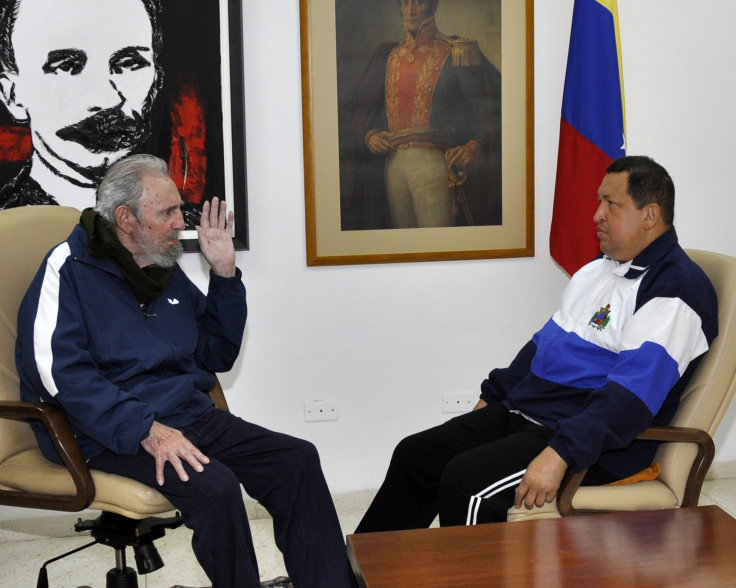The Havana Connection: Will The Venezuela-Cuba Alliance Change After Chavez?

Cuban doctors are closely attending to their VIP patient and Fidel Castro’s protégé Hugo Chavez, president of Venezuela, as he continues his recovery a month after cancer surgery, and with the fate of his country’s longtime alliance with Havana resting upon his health.
Senior Venezuelan officials, including Vice President Nicolas Maduro and National Assembly Speaker Diosdado Cabello, have traveled to Havana to visit Chavez and meet with Cuban President Raul Castro.
The nature of these meetings has not been disclosed by either side, but the increasing probability of a power transfer in Caracas and the subsequent holding of snap elections that could usher in a government less favorable to Havana have most certainly not been lost on the Cubans.
“The Cuban economy is enormously dependent on Venezuela,” said Eduardo Gamarra, professor of political science at Florida International University. “Its sustainability depends on what happens to the regime in Caracas.”
Since Chavez took office in 1999, where he has remained over 14 years after three re-elections, relations between Venezuela and Cuba have strengthened immensely due to their governments’ shared socialist ideology and Chavez’s veneration of Fidel Castro as a revolutionary and mentor.
Venezuela currently supplies Cuba with more than 100,000 barrels of subsidized oil a day, accounting for a majority of its daily consumption.
In exchange, Cuba sends doctors, educators and political consultants to Venezuela, though Caracas still pays out some $6 billion a year for these services, the Daily Telegraph reported, giving Cuba additional economic support.
Furthermore, Venezuela is investing in infrastructure projects in Cuba, such as the expansion of the Cienfuegos oil refinery, and remains the island nation’s primary trading partner.
Without Venezuela’s assistance, Cuba would have succumbed to the economic slump it fell into during the 1990s after the collapse of its chief economic patron, the Soviet Union.
“After that, Cuba had no other options other than opening up its economy,” said Gamarra. “And then came Venezuela (in 1999), which has been a much better partner than the Soviet Union ever was.”
Now Cuba is closely watching over political developments in Caracas as the likelihood of Chavez being unable to continue in office becomes more palpable.
Before traveling to Cuba for his fourth cancer-related operation last month, Chavez handpicked Maduro to be his political heir, asking his supporters to back him for president if new elections were to be held.
According to the Venezuelan constitution, if the present is “absolutely absent” from office within the first four years of his six-year term, new elections must be held within 30 days.
Last week, the Venezuelan Supreme Court upheld the National Assembly’s decision to postpone Chavez’s Jan. 10 inauguration on the basis that he is an incumbent, allowing him an indefinite period to recover and return to office.
Whether or not Maduro eventually replaces Chavez is not important to Havana, Gamarra said, only that Cuban-Venezuela relations remain strong.
“Some say they (the Cuban government) prefer Maduro or that they prefer Cabello, but they prefer anybody that keeps their economy sustainable,” Gamarra added.
This does not necessarily preclude Venezuela’s political opposition, which has been relatively silent on how it would handle relations with Cuba if it were in power.
“The opposition has been very careful not to send the message that they would cut assistance to Cuba,” Gamarra said, adding that doing so would undermine their support from many governments in the region that are sympathetic to the Chavez administration. “They would be shooting themselves in the foot.”
Opposition leader and Miranda state Gov. Henrique Capriles Radonski, who ran against and was defeated by Chavez in October, has made it clear during his presidential campaign that he would renegotiate Venezuela’s relationship with Cuba, and that under his leadership the country would “not give away oil to anyone,” Reuters reported.
There is also growing frustration among many Venezuelans who question the government’s lopsided support of Cuba amid a stagnating economy and rampant crime, which has materialized to some extent into increased support for the pro-capitalist opposition.
Chavez’s Socialist party faced its greatest challenge yet in October’s presidential elections, still winning by a decisive margin, 55 percent to 45 percent, but a much narrower one than in previous elections.
At the same time that the opposition has been careful not to ostracize itself regionally over Cuba, so too has the Castro administration been careful not to condemn Chavez’s political rivals and potentially damage relations with what could be a less sympathetic administration if new elections are held.
“If the opposition wins,” Gamarra said, “They (Cuba) better start making friends with them.”
© Copyright IBTimes 2024. All rights reserved.











